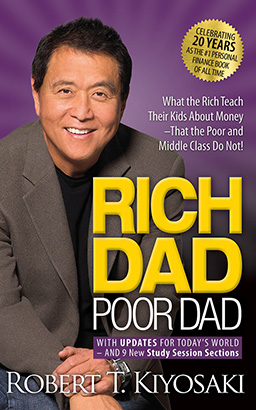Key Takeaways
- Assets bring money into your pocket and liabilities take money away from your pocket, one of the most important lessons in the Rich Dad Poor Dad summary.
- Your house could be your biggest liability unless it is generating rental income.
- Buy assets and use them to pay for your liabilities.
- Poor people work for money while rich people make their money work like an employee for them.
- To escape the rat race, you must acquire financial knowledge.
Here is the Rich Dad Poor Dad book summary by Robert Kiyosaki, which is the lifeline if you want to escape the rat race. The book revolves around 3 characters,
- The Author (Robert)
- Poor Dad (Robert’s Biological Father)
- Rich Dad (Father of Robert’s Friend Mike)
The poor dad is highly educated, while the rich dad did not even finish school.
Throughout the book, the author compares both the fathers’ approaches to life, money, and education. The poor dad was struggling financially, while the rich dad was one of the richest men in the country. The poor dad was stuck in a vicious cycle of the rat race.

The poor dad had the traditional belief in studying hard, getting a degree and then getting a job in a “good” company. On the other hand, the rich dad said that school never teaches you how to make money and that the notion “a job gives you security” is a lie. Instead, you should be looking for ways to create jobs for others.
Rich Dad Poor Dad Chapter Summaries
1. The Rich Don’t Work For Money
Robert and Mike started a company that made counterfeit nickel. Mike’s father informed the two boys about this illegal activity, and they gave it up. The two boys started learning about money and how it works from Mike’s father, the rich dad. The rich dad told them that he is not going to teach them in the traditional style where you sit in the classrooms and listen to boring lectures; rather, he wants to teach them the way life teaches us practically by working.
People spend years studying the lessons about life, while no book teaches more effectively than the practical lessons of life.
They started working at 10 cents an hour. After 2 weeks, fed up with boring work and being paid very little, Robert decided to meet Mike’s Dad and quit.

Robert’s poor dad advised him to demand at least 25 cents per hour. Robert went to meet his Rich dad. He was made to wait more than an hour longer than expected, which made him extremely angry. Robert felt that he was being manipulated by the rich dad more than anything else.
The rich dad told Robert that he wanted him to learn the way life teaches rather than learning from school, which does not work in practice.
The lesson learnt by Robert that day was
- Either to work as an ordinary employee who works his whole life putting little money in his pocket and a large sum of money in someone else’s pocket, or,
- Find out another way to make money for himself
Rich dad settled with them to work for free and to do so for three weeks. After that, the rich dad offered them 25 cents per hour, which they rejected, followed by $1 an hour, which they also rejected. He kept increasing the wage up to $5 an hour, but the boys did not accept. The boys had learned their lesson.
Real-life example from Rich Dad Poor Dad
You need to get out of the rat race if you want to become wealthy. For example, a newly married couple, Jason and Sarah, worked in a private company. They bought a house on a monthly instalment. After some time, they also bought a car, causing a rise in their monthly expenses. Now Jason is caught. He goes to work daily and works out of his skin due to the fear that if he doesn’t work, he will not be able to meet the expenses. Time passed by, and the couple had a baby. Jason is now doing 2 jobs. As his income increased, his desires increased. So his monthly expenses have also increased. This vicious cycle will continue.
People spend their whole lives working for these two emotions, fear and desire. Robert calls it the rat race.
The two boys started their own little business. It was a library of comic books. The children in the library were allowed to read comic books for two hours after school for 10 cents. They collected on average $9 every week and paid $1 every week to Mike’s sister for managing the library. The business continued for three months only, but they learned the important lesson: make money work for you rather than working for money.
2. Why Teach Financial Literacy
This is the core argument of this book.
The rich buy assets.
By assets, we mean anything that generates money without you being there or working for it.
The middle class buy liabilities believing they are buying assets.
You may consider your car your asset, but it isn’t. You have to spend money to maintain your car, including fuel, etc. It’s not generating you money. It’s a liability. Or you might have a house that you consider your asset, when it might be the biggest liability. Unless it’s earning you rental income.
Some rich men joined together at a business meeting. Twenty-five years later, a large majority of these wealthy people either went broke, died or were in jail. The biggest financial lesson from the result of these unfortunate wealthy people is that you need financial literacy to keep your money safe. If you need to construct a house, for instance, build a strong base first.

If you want financial freedom, learning accounting is a must.
Middle-class people work so that they can earn money. Rich people make money work for them like an employee.
The rich buy assets with their income, and those assets generate further income for them. Most poor people use their income on expenses, bills, food, taxes, etc. With no money left for assets. Middle-class people spend their hard-earned money on liabilities, believing they are buying assets.
For example, Joe bought a new AC last month, thus more electricity bill. On the other hand, Julia has rented out some properties. Her rental income is $100,000 per month. Her expenses are $50,000 per month. The remaining 50,000 will be used to acquire more assets. Assets could be in any form, like real estate, bonds, stocks or any business where you don’t need to work. One of the key differences between the rich and the poor is that the rich buy luxuries at the end only when their assets are generating enough income, while the poor buy luxuries first.
3. Mind Your Own Business
Robert gives the example of McDonald’s and says that McDonald’s may not make the best hamburgers in the world, but they own more real estate than any other organisation in the world.
You should mind your own business. Otherwise, you will spend your whole life working for everyone but yourself. By working for someone else, you are putting money in someone else’s pocket instead of your own.
The author emphasises the importance of building assets. Assets are, e.g. stocks, bonds, notes, income-generating real estate, royalties from intellectual property, etc.
One must have a financial IQ. One must know accounting, how to invest and how the markets work.
4. The Rich Invent Money
The author talks about the concept of self-doubt. He mentions that everyone has the talent, but that is suppressed by self-doubt and fear. Generally, the bold people get ahead rather than the educated, smart people.

People may have a lot of money, but they don’t get ahead because they wait for an opportunity to come. You need to create an opportunity. You cannot sit and wait and hope something comes along. Financial knowledge is the key here. People who get out of the rare race the quickest are the people who understand numbers and have creative financial minds, says Robert Kyosaki.
A trained mind is a rich mind when investing money. It’s not gambling when you are aware of your actions. Gambling is when you throw your money into a deal, have not much idea of what you are doing and pray. People are afraid of losing because this is what they have learnt in school for years. In real life, we learn from mistakes.
If you don’t fall, you can’t rise. The fear of losing stops people from getting ready. Robert believes that people should hire more intelligent people and capitalise on their knowledge.
5. Work For Learning, Don’t Work For Money.
Robert shares his conversation with a journalist who had a master’s degree in English literature. She was a brilliant writer, but didn’t get a good response. The author advised her to take a sales course to learn the art of selling, which offended her. She said that she has a master’s degree why should she go back to school to learn sales? Robert emphasised that he is the best-selling author, not the best writing author.
There are so many highly skilled people in the world, like doctors, engineers and scientists, yet they are not that wealthy. They are one skill away from becoming rich, and that is the financial education of the real world.
Robert believes that the law of money is, “give and you shall receive”. He mentioned that rich people spend a lot of money on charity. The money that you give to charity, nature makes it come back to you.
6. Overcoming Obstacles
The author believes that human behaviour is affected by five emotions.
- Fear
- Cynicism
- Laziness
- Bad Habits
- Arrogance
No one likes losing money, whether rich or poor.
Rich Dad motivated both children to take risks when they were young. The author gives the example of Texans who are not afraid of taking risks. They win big or lose big. They learn from their laws, and it inspires them.
Most people want to stay safe. That’s why they invest in low-yield mutual funds. That’s not the way rich people invest. To achieve success, you need to focus, that is, follow one path until successful.
Rich dad believed that instead of saying I can’t afford it, you should say How can I afford it? When you say I can’t afford it, it shuts your mind down. When you ponder this question, how will I be able to pay for it? It opens your mind, and you start to figure out how you can generate wealth.
The author believes that you need to pay yourself first, otherwise you might not have any money left after paying off the bills. When you pay yourself first, you need money to pay your bills, and your mind starts finding out ways to do that. Robert promotes the idea of being greedy because it benefits you. You should be asking yourself, “What’s in it for me?”
7. Getting Started
This chapter gives practical tips for getting started.
To start, you must discover a motivation that exceeds your current situation, inspiring you to reach your goals. You need to develop good habits.
It’s important to understand investing before making any investments. The writer advises that you should select your friends wisely. Your friends should be people who talk about money-making and are interested in the subject. They can give you some valuable pieces of information.
Robert also believes that prioritising your own financial needs is essential. People who pay themselves first have their asset column built and increasing, and it adds to their income. On the other hand, people who pay themselves last lose all the money to their expenses. Even if your cash flow is less than your bills, you need to pay yourself first and find out ways to generate money to pay for your bills.
One more piece of advice the author provides is to compensate your broker generously. He is the one who is helping you earn money. The person who generates more income will also create more profits for you.
Robert believes in giving charity, and nature finds a way to deliver it back to you, or even more, if you want something, you first need to give.

8. Still want more? Here are some To DO’S.
This chapter adds to the tips given in the previous chapter and acts as a supplement.
The author says that if your current plans are not yielding your desired results, you need to change your approach.
He encourages people to learn new ideas, benefit from the experience of successful people, take classes, read and attend seminars regarding real estate investment. He advises driving an area once a month for 10 months. You can find very lucrative real estate investments by driving around.
People can buy real estate even if they don’t have enough funds. Just some class is required.
Final thoughts
It’s impossible to achieve true wealth and security by being an employee.
To become wealthy, it’s essential to understand the distinction between assets and liabilities and focus on increasing your asset column.
Assets generate your income, whereas liabilities diminish your financial resources. Your home and vehicle are considered liabilities.
You should not work for money. Make your money work for you. Gain financial and accounting knowledge. Learn about how markets work and how to invest.
Pay yourself first. Be rich.

1 thought on “Rich Dad Poor Dad Summary (2025): 6 Money Lessons That Will Change Your Life”